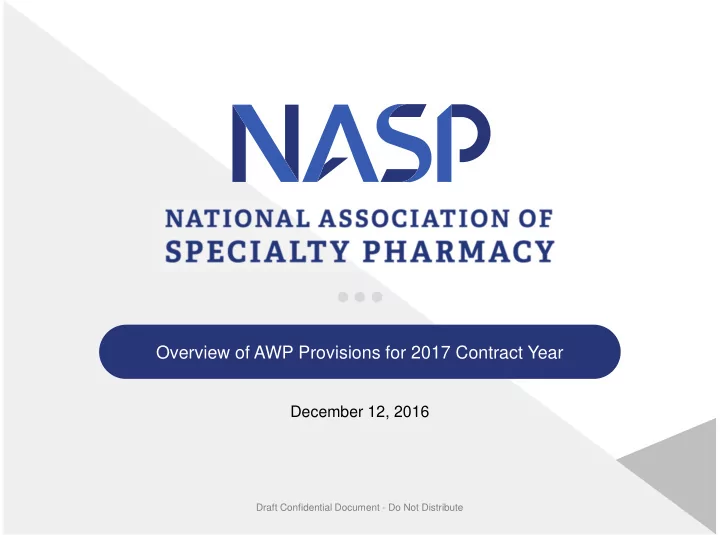

Overview of AWP Provisions for 2017 Contract Year December 12, 2016 Draft Confidential Document - Do Not Distribute
Any Willing Pharmacy (AWP) Background The Social Security Act *, Medicare CMS guidance to Part D Prescription CMS has the authority to review all Part D regulations ** and the CMS Drug Plans indicates that baseline sponsor’s materials to assure AWP Medicare Prescription Drug Benefit conditions of participation established compliance and whether standard Manual *** all require Medicare Part D by sponsors must be related to health terms and conditions are Prescription Drug Plans to permit “the and safety or financial integrity (e.g. reasonable and relevant. participation of any pharmacy that licensure, liability insurance &/or meets the terms and conditions under accreditation). Sponsors will negotiate the plan. Such terms and conditions varying payment rates to secure must be “reasonable and relevant.” certain pharmacy participation. *Section 1860D-4(b)(1)(A); **42 CFR Section 423.120(a)(8)(l); *** Section 50.8.1 2
The Specialty Pharmacy Marketplace Specialty Pharmacies come High-touch SRx patient services vary in many flavors: based on geographic market, disease › Independent State, Regional & National Reach category, co-morbid conditions, › PBM and/or Plan affiliated or owned physician medical subspecialty › Integrated delivery networks &/or ACO affiliated or owned expectations, patient observation and › Disease-specific focus reporting requirements, including REMS › Contracted 340(b) provider › Patient Assistance Dedicated programs, patient co-payment › Compounding and non-compounded requirements, clinical pathways, etc. › Dispensing Oral, Injectable, Implanted and/or Infused Therapies 3
AWP Provisions with Differential Impacts Some Specialty Pharmacies are adversely impacted by Terms and Conditions that do not apply to their specific service model. This produces differential impact across Specialty Pharmacies from Plan Sponsor terms and conditions. Examples: › Licensure in all 50 states, Guam and Puerto Rico • Not relevant to localized care that SPs provide. Creates unnecessary costs and eliminates patient/provider intimacy key to persistence, compliance and clinical outcomes. • Tilts the playing field in favor of larger, national footprint specialty pharmacies affiliated with Plans and PBMs, thereby risking the loss of disease and/or therapy subject matter experts. › Network Pharmacies required to have access to a broad range of Limited Distribution Drugs or a broad range of drugs across all disease categories. • Narrows the number of pharmacies available to patients and referring physician. › Multiple accreditation requirements (JCAHO, ACHC, URAC, PCAB, etc.) essentially duplicating the same reviews, data reporting and oversights. › Overly-high minimum threshold of financial assistance for covered beneficiaries. › Minimum on-site inventories & capacity to ship 1500 scripts a day. › Capacity and contracted arrangements for home nursing licensure across 50 states, even though the disease or therapies in which the individual SRx specializes do not require home health nursing support to assure patient therapeutic success. 4
AWP Provisions Create Market Distortions › Terms are not correlated to improving beneficiary car or therapeutic outcomes. › Plan Sponsors should not set up Benefits Plans in which only one PBM-affiliated SRx satisfies the requirements of network participation. Further PBMs should not be able to subsidize economically affiliated SRx in negative margin. › Terms result in excluding specialty pharmacies and narrowing pharmacy network access for patients. › Excluding these pharmacies reduces physician and beneficiary choices by eliminating healthy competition. › Financial terms are often below margin before pharmacies begin to provide the patient access, coordination of benefits, patient education, persistency management and/or data reporting requirements. › Requirements tilt the playing field in favor of size and volume savings as opposed to high-touch, in community provider/patient intimacy. › Unit cost, reimbursement compression and Plan administrative burdens threaten to eliminate all but high volume, low-touch pharmacy services. 5
AWP - Next Steps REQUIRE PLAN SPONSOR TERMS AND CONDITIONS TO: Comply with the CMS Manual option for sponsors to “modify some standard Disclose the identities Hold PBM-owned specialty terms and conditions to and disease/drug focus of pharmacies to the same encourage participation by each SRx in the Plan standards as all other pharmacies.” Sponsor’s Network. network pharmacies. Be demonstrably reasonable Include in Plan Sponsor Transition from a and/or relevant to quality of SRx Networks all SRx that drug-based reimbursement beneficiary care sufficient to are contracted with model to a drug plus fee justify SRx exclusion and/or Manufacturers to have for service model. narrowing of pharmacy access to the Manufacturer’s options for beneficiaries. Limited Distribution Drugs. 6
Modified Submission Improves Beneficiary Care CMS can post detailed submissions Provide for greater than 30-day notice about SRx Provider Options to beneficiary when current specialty on the Medicare Plan Finder website. pharmacy is no longer in-network. › Allows beneficiary to choose plan that has an in-network pharmacy for their specialty therapy. › Expedites access to care because provider can send initial prescription to an in-network pharmacy. 7
Recommend
More recommend